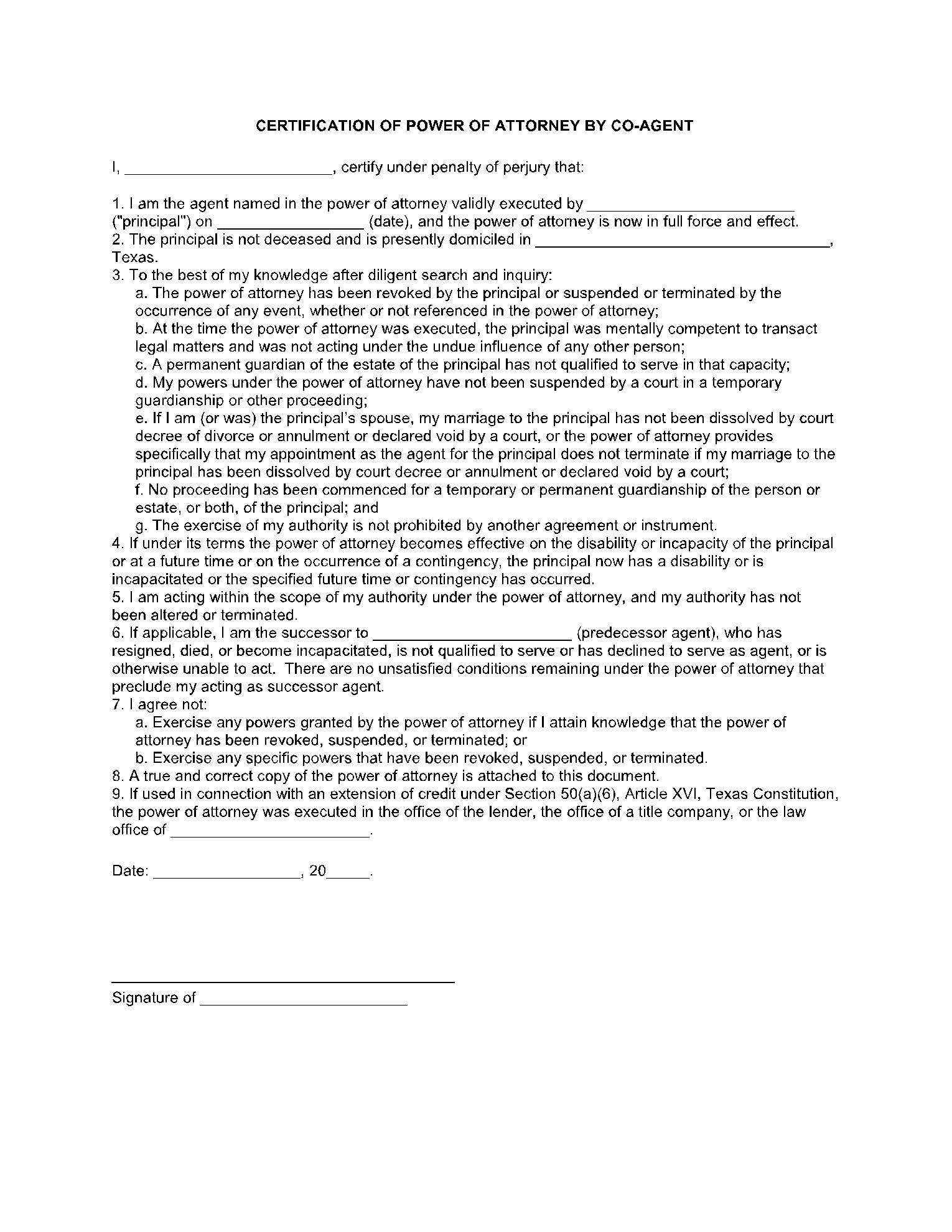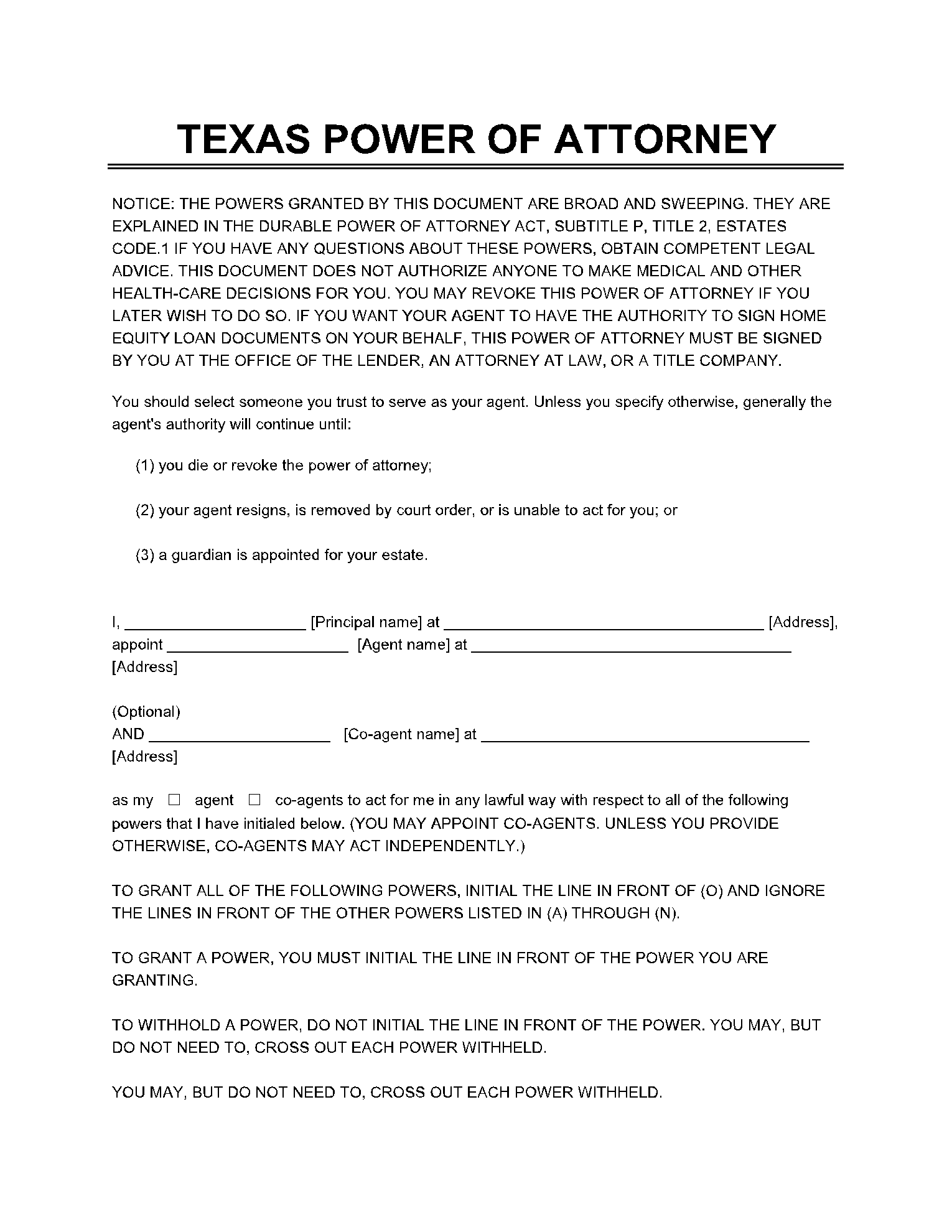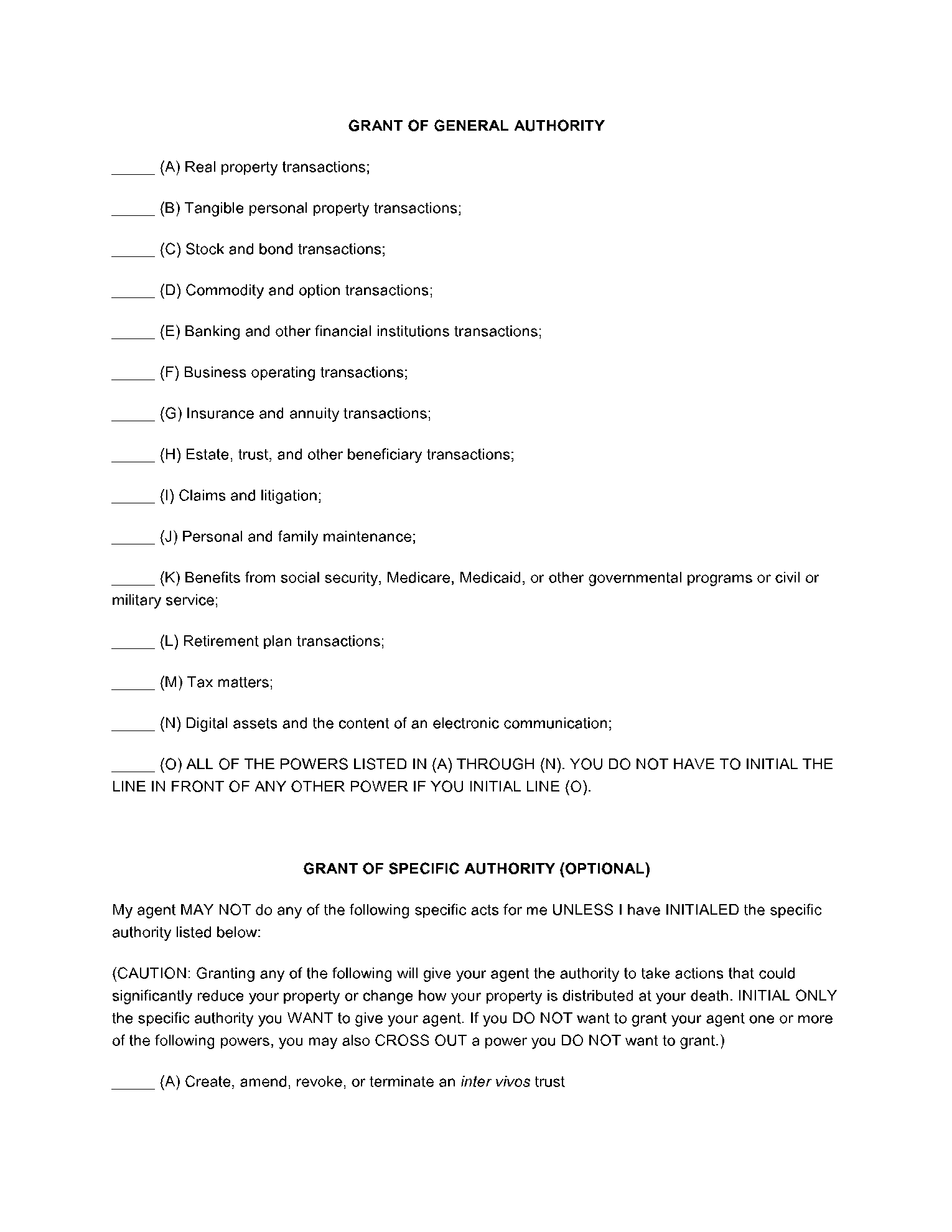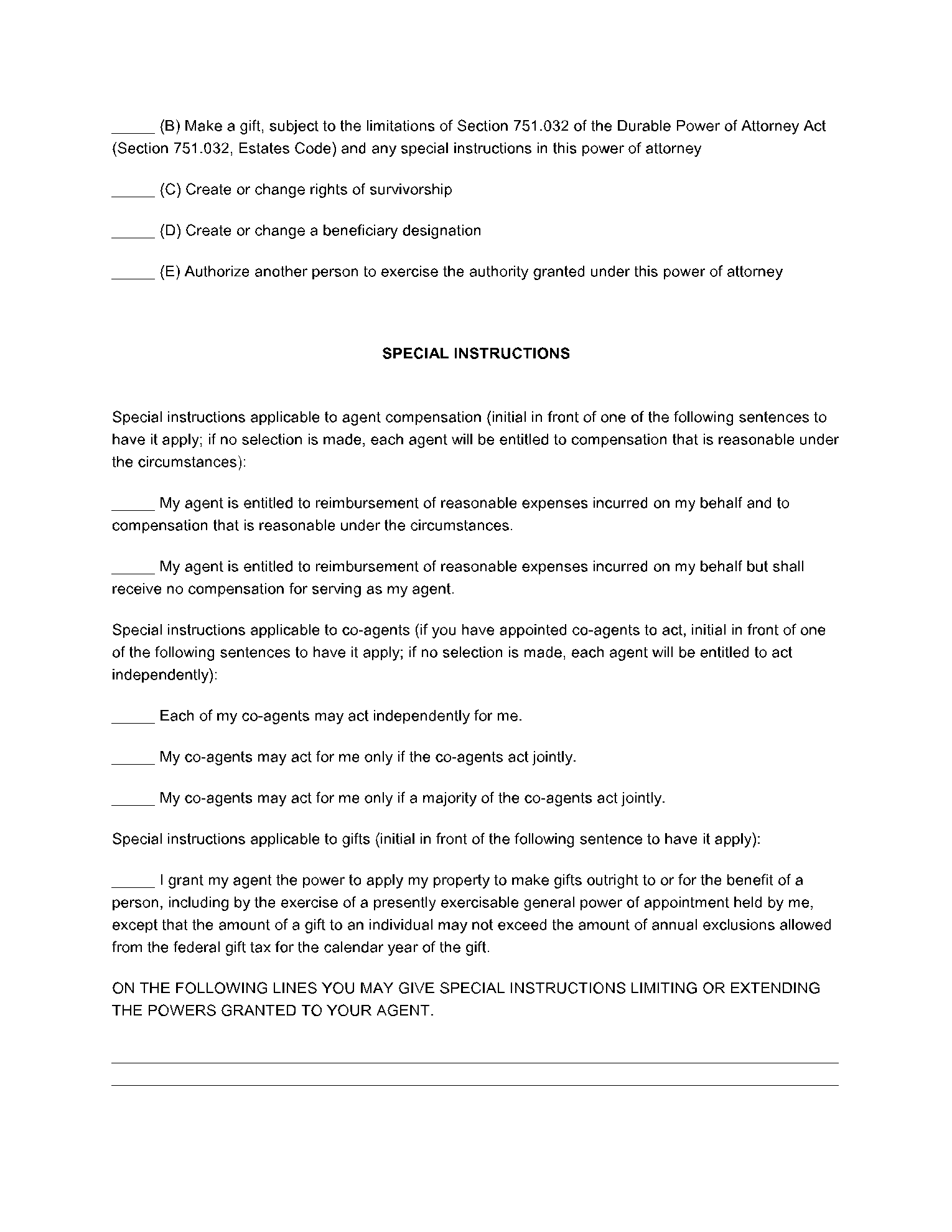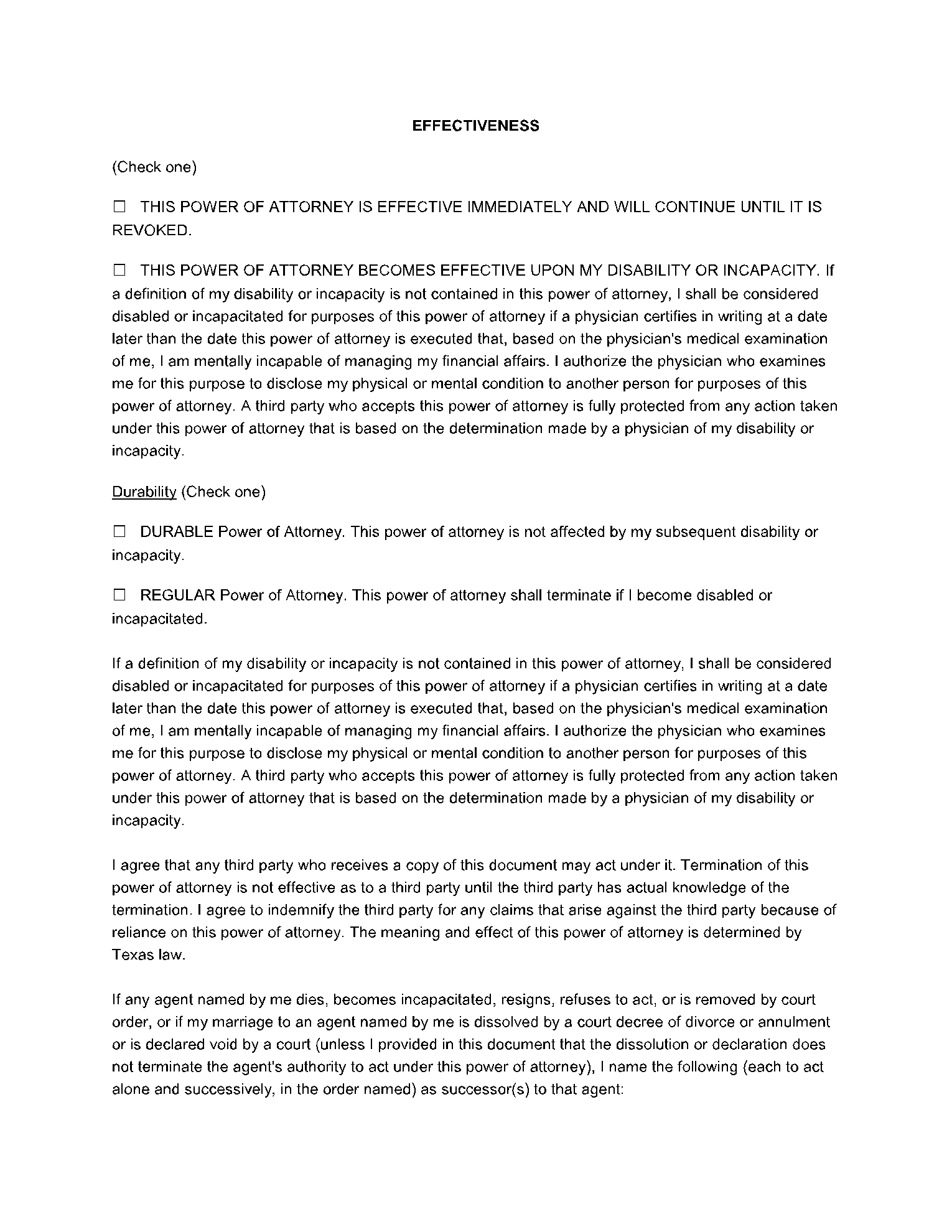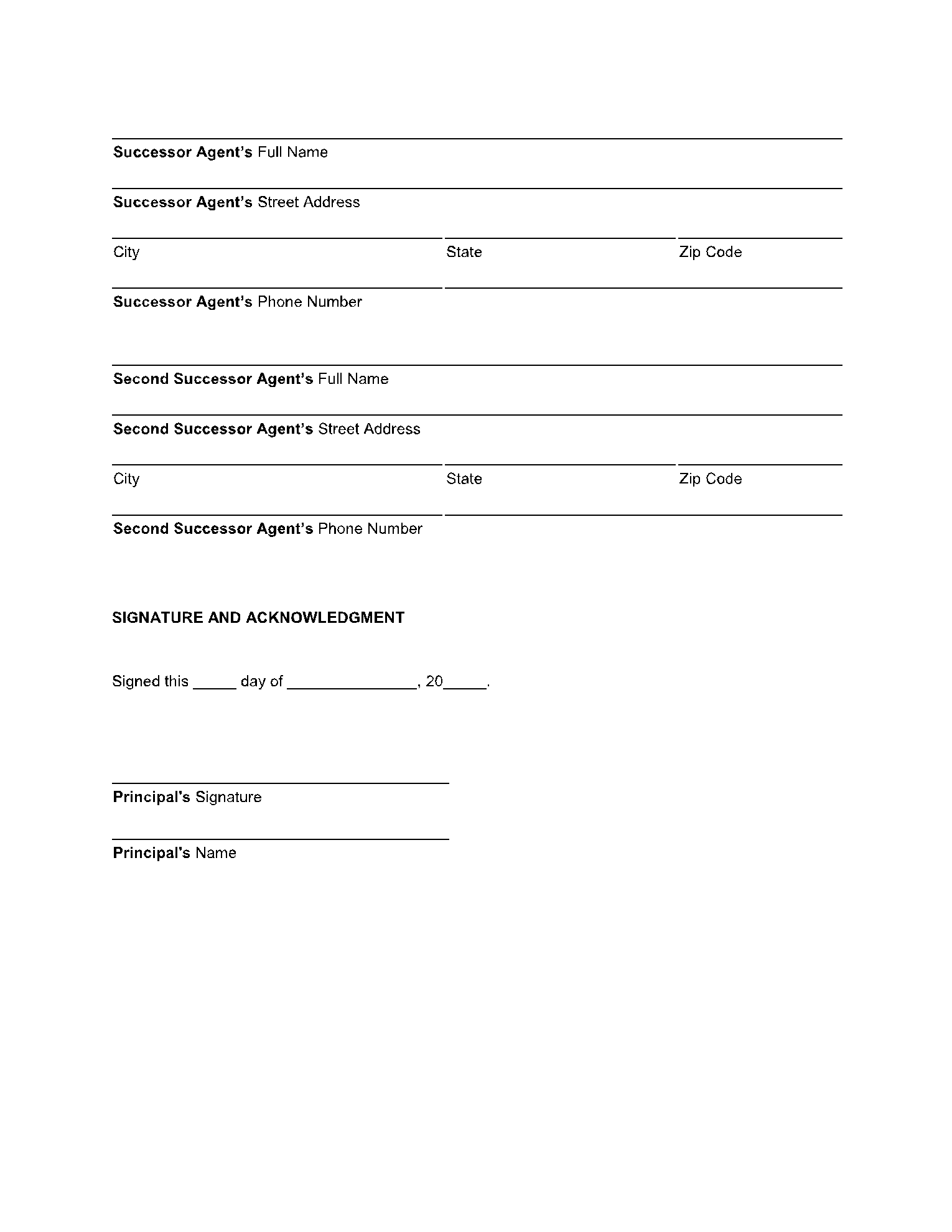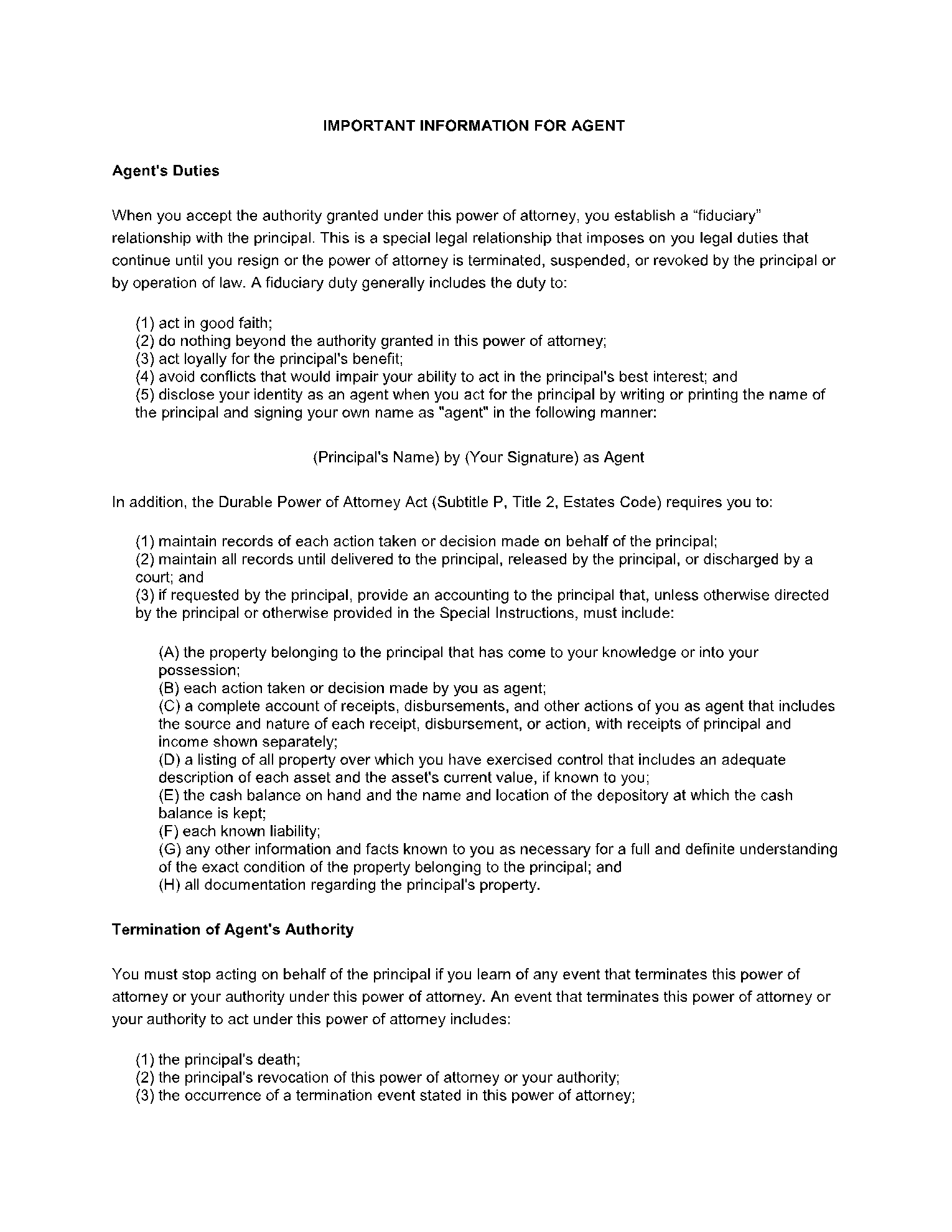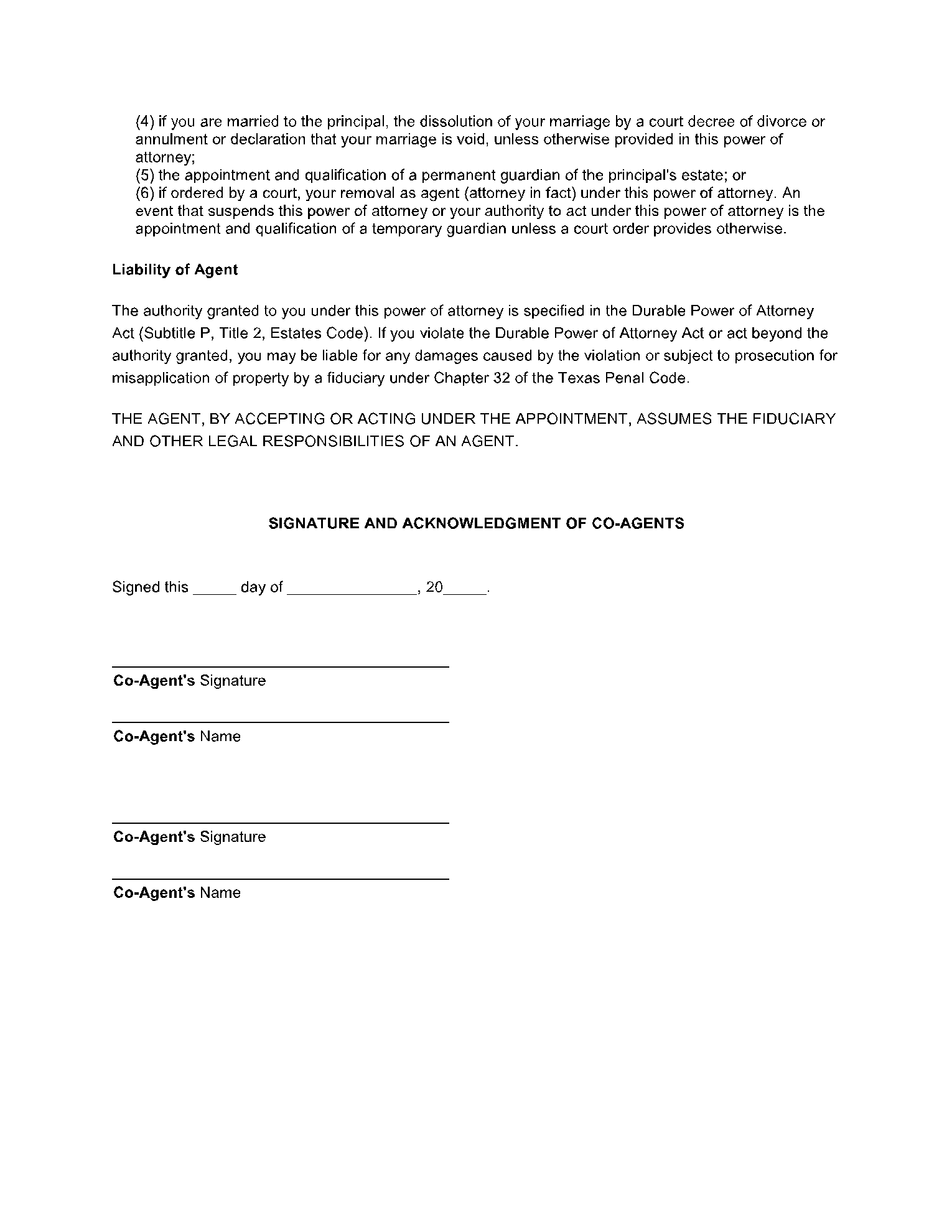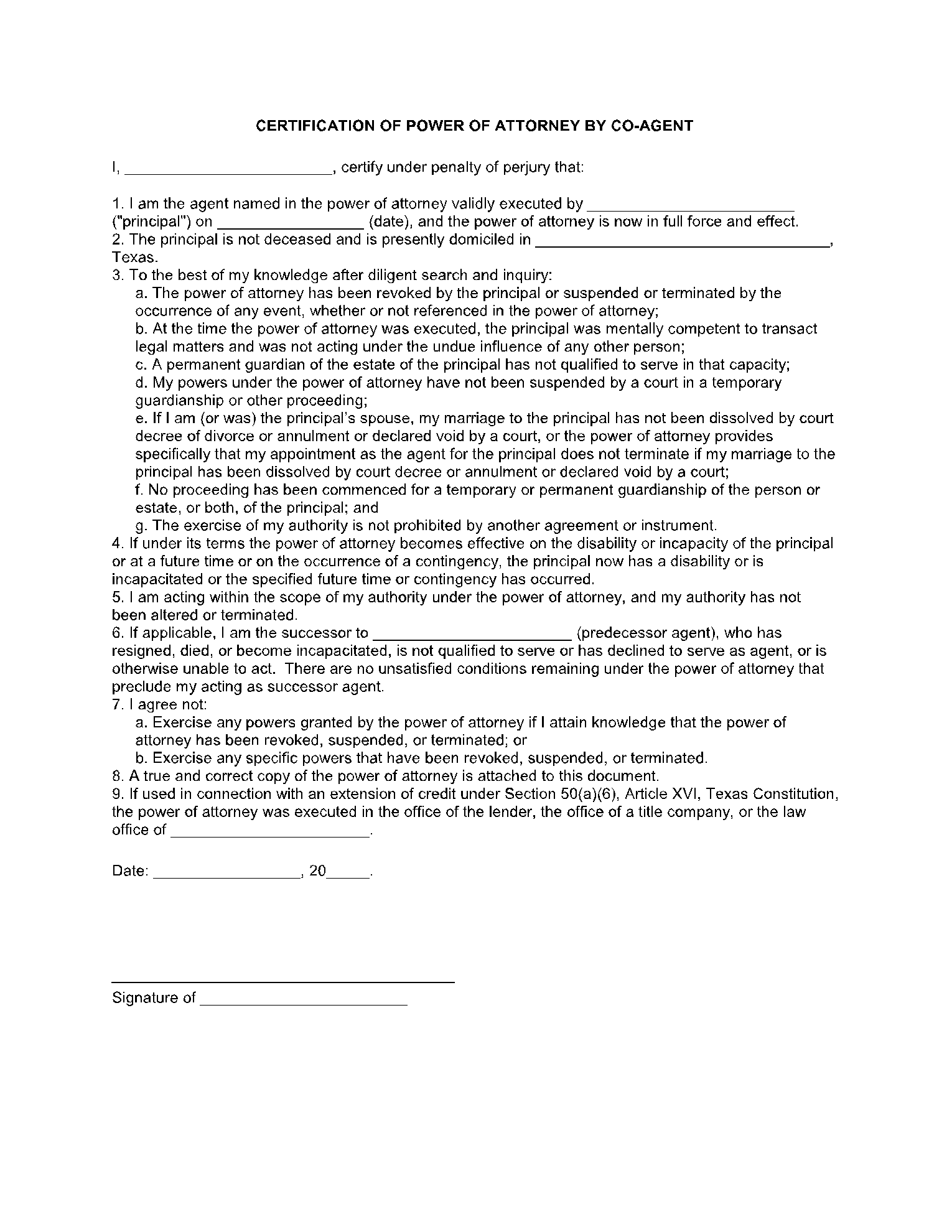A power of attorney is a legal document that allows you to provide legal authority to someone else to act on your behalf. The laws regarding this legality differ depending on the state you live in.
This article will give you all the details you need to know about the power of attorney forms in Texas, including what it does, requirements to fill-up the form, the types of power of attorney, and more.
The elements of a Texas power of attorney form include:
-
- Type of power of attorney
- Executor details
- Agent details
- Powers and responsibilities of the agent
- Purpose
- Property details
- Execution date Notarized
What is Texas Power of Attorney?
A power of attorney form Texas is the legal means to appoint yourself an agent who can act on behalf of you for making certain business or legal decisions in Texas. The person vested with a power of attorney is called the agent, and the person granting someone else such rights is called the principal.
A power of attorney is essentially a legal document that sets forth the rights and authorities given to the agent by the principal.
It allows the agent to do things that the principal needs to get done and does not necessarily take the control away from the principal. The principals can still make their own decisions pertaining to their legal, medical, and finance matters in their capacities.
A power of attorney can be brought to an end by the following methods:
- It ends naturally if specified with an end date
- Unless a durable power of attorney is used, it could end if the principal becomes incapacitated to continue with the arrangement
- It can end anytime the principal wishes to revoke the power of attorney rights
- It ends when a guardian of the estate is appointed for the principal. The estate can refer to all the assets and properties held by the principal
- It ends when that principal or agent dies
- In the case of the spouse being the agent, a power of attorney ends on the day of divorce finalization
Download our power of attorney Texas template!
Want to create a power of attorney for Texas? Why not give our power of attorney Texas template a try?! It’s simple, easy to understand, and completely free of charge!
Download a copy of this PoA template below.
Why Would You Use a Texas Power of Attorney Form?
Free power of attorney form is a useful legal aid that can help you carry out a multitude of tasks with the help of an agent. It can be extremely helpful when you are physically unable to present yourself for legal and financial take.
The Texas State laws mandate a valid Power of Attorney form for any government agency or third party offices to accept an agent to represent yourself.
For instance, real estate agents can be given a power of attorney to carry out property-related transactions.
The power of attorneys can help you delegate responsibilities and carry out the financial and legal transactions without any delay. They also help transfer decision making to a person of your choice in case of any medical emergencies or minor guardian issues.
What Are The Power of Attorney Requirements in Texas?
There is a certain set of minimum requirements that should be met for a power of attorney to be considered legal and effective. For a valid power of attorney, the Texas state puts forth the following requirements, as specified under chapter 752 of the Texas Estate code:
- The power of attorney document should be signed before a notary public.
- The person signing should be of proper legal age and should have completed 18 years of age at the least.
- The principals should be of sound mind when signing the power of attorney document. They should be aware of the legal implications and the exact extent of the rights they grant to the agent.
- In case of a Texas power of attorney used for real estate transactions, the document should be filed with the clerk of the county corresponding to the location of the property.
The document must have the name and sign of the principal, name of the agent(s), date of the agreement, powers granted specifically mentioned, date of commencement, and end of powers.
Types of Power of Attorney in Texas
Based on the extent of rights and the purpose, a power of attorney can be classified into several types.
General Power Of Attorney
A standard general power of attorney gives the agent the right to act on a wide range of activities. This type of power of attorney is usually used when the principal is unable to carry out certain tasks. The principal could be physically or mentally disabled or incapacitated.
This type of power of attorney is granted to the agent in case of a limited duration for handling specific matters. For instance, the principals could be expected to be overseas and want certain tasks to be carried out by their agent.
Texas Durable Power Of Attorney
When a general power of attorney is extended due to the principal becoming incapacitated or disabled for a longer duration, it is called a durable power of attorney Texas. If the principal is unable to recover to normal, the power of attorney rights can be extended.
Springing Power Of Attorney
A springing power of attorney is put in place and comes into effect only when the principal becomes physically or mentally disabled or incapacitated. The agent gains authority only upon the condition that the principal is no longer able to carry out their tasks.
Texas Medical Power Of Attorney
A medical power of attorney Texas is specifically used for making medical decisions on behalf of a principal who is no longer in a sound physical or mental capability to decide for themself. This power of attorney gives only the right to make treatment and medicine related decisions to the agent.
Guardian of Minor Power of Attorney
Power of attorney child Texas is used to delegate guardian rights of a minor child to someone else other than the parents. Parents may choose someone to care for their children in case they become incapacitated.
Tax Power Of Attorney
This type of power of attorney is a special type wherein the agent is a tax professional and is given rights to carry out tax-related matters.
Vehicle Power Of Attorney
This power of attorney gives rights to the agent to deal with the principal's vehicle issues with the Texas Department of Motor Vehicles.
Real Estate Power Of Attorney
This power of attorney is used to delegate property related transactions and dealings to an agent.
How to Get A Power of Attorney in Texas
The procedures and processes related to the Power of attorney rights in Texas are governed by Chapter 752 of the Texas Estate Code.
To get a power of attorney, you should fill up a form and get it signed with a notary public. Do check the requirements part to know what makes a power of attorney valid.
You can download the specific forms to be used for each type of power of attorney for free online.
Download our power of attorney Texas template!
Want to create a power of attorney for Texas? Why not give our power of attorney Texas template a try?! It’s simple, easy to understand, and completely free of charge!
Download a copy of this PoA template below.
Conclusion
The power of attorney forms should be properly formatted and should have valid details to be considered legally valid. You can download valid power of attorney documents templates for free from CocoSign. Check out our extensive collection now.
DOCUMENT PREVIEW
TEXAS STATUTORY DURABLE POWER OF ATTORNEY
NOTICE: THE POWERS GRANTED BY THIS DOCUMENT ARE BROAD AND SWEEPING. THEY ARE EXPLAINED IN THE DURABLE POWER OF ATTORNEY ACT, SUBTITLE P, TITLE 2, ESTATES CODE. IF YOU HAVE ANY QUESTIONS ABOUT THESE POWERS, OBTAIN COMPETENT LEGAL ADVICE. THIS DOCUMENT DOES NOT AUTHORIZE ANYONE TO MAKE MEDICAL AND OTHER HEALTH-CARE DECISIONS FOR YOU. YOU MAY REVOKE THIS POWER OF ATTORNEY IF YOU LATER WISH TO DO SO. IF YOU WANT YOUR AGENT TO HAVE THE AUTHORITY TO SIGN HOME EQUITY LOAN DOCUMENTS ON YOUR BEHALF, THIS POWER OF ATTORNEY MUST BE SIGNED BY YOU AT THE OFFICE OF THE LENDER, AN ATTORNEY AT LAW, OR A TITLE COMPANY.
You should select someone you trust to serve as your agent. Unless you specify otherwise, generally the agent's authority will continue until:
(1) you die or revoke the power of attorney;
(2) your agent resigns, is removed by court order, or is unable to act for you; or
(3) a guardian is appointed for your estate.
I, __________________________________________ (insert your name and address), appoint __________________________________________ (insert the name and address of the person appointed) as my agent to act for me in any lawful way with respect to all of the following powers that I have initialed below.
(YOU MAY APPOINT CO-AGENTS. UNLESS YOU PROVIDE OTHERWISE, CO-AGENTS MAY ACT INDEPENDENTLY.)
TO GRANT ALL OF THE FOLLOWING POWERS, INITIAL THE LINE IN FRONT OF (O) AND IGNORE THE LINES IN FRONT OF THE OTHER POWERS LISTED IN (A) THROUGH (N). TO GRANT A POWER, YOU MUST INITIAL THE LINE IN FRONT OF THE POWER YOU ARE GRANTING. TO WITHHOLD A POWER, DO NOT INITIAL THE LINE IN FRONT OF THE POWER. YOU MAY, BUT DO NOT NEED TO, CROSS OUT EACH POWER WITHHELD.
____ (A) Real property transactions;
____ (B) Tangible personal property transactions;
____ (C) Stock and bond transactions;
____ (D) Commodity and option transactions;
____ (E) Banking and other financial institution transactions;
____ (F) Business operating transactions;
____ (G) Insurance and annuity transactions;
____ (H) Estate, trust, and other beneficiary transactions;
____ (I) Claims and litigation;
____ (J) Personal and family maintenance;
____ (K) Benefits from social security, Medicare, Medicaid, or other governmental programs or civil or military service;
____ (L) Retirement plan transactions;
____ (M) Tax matters;
____ (N) Digital assets and the content of an electronic communication;
____ (O) ALL OF THE POWERS LISTED IN (A) THROUGH (N). YOU DO NOT HAVE TO INITIAL THE LINE IN FRONT OF ANY OTHER POWER IF YOU INITIAL LINE (O).
SPECIAL INSTRUCTIONS:
Special instructions applicable to agent compensation (initial in front of one of the following sentences to have it apply; if no selection is made, each agent will be entitled to compensation that is reasonable under the circumstances):
____ My agent is entitled to reimbursement of reasonable expenses incurred on my behalf and to compensation that is reasonable under the circumstances.
____ My agent is entitled to reimbursement of reasonable expenses incurred on my behalf but shall receive no compensation for serving as my agent.
Special instructions applicable to co-agents (if you have appointed co-agents to act, initial in front of one of the following sentences to have it apply; if no selection is made, each agent will be entitled to act independently):
____ Each of my co-agents may act independently for me.
____ My co-agents may act for me only if the co-agents act jointly.
____ My co-agents may act for me only if a majority of the co-agents act jointly.
Special instructions applicable to gifts (initial in front of the following sentence to have it apply):
____ I grant my agent the power to apply my property to make gifts outright to or for the benefit of a person, including by the exercise of a presently exercisable general power of appointment held by me, except that the amount of a gift to an individual may not exceed the amount of annual exclusions allowed from the federal gift tax for the calendar year of the gift.
ON THE FOLLOWING LINES YOU MAY GIVE SPECIAL INSTRUCTIONS LIMITING OR EXTENDING THE POWERS GRANTED TO YOUR AGENT.
______________________________________________________________________
______________________________________________________________________
______________________________________________________________________
UNLESS YOU DIRECT OTHERWISE BELOW, THIS POWER OF ATTORNEY IS
EFFECTIVE IMMEDIATELY AND WILL CONTINUE UNTIL IT TERMINATES.
CHOOSE ONE OF THE FOLLOWING ALTERNATIVES BY CROSSING OUT THE ALTERNATIVE NOT CHOSEN:
(A) This power of attorney is not affected by my subsequent disability or incapacity.
(B) This power of attorney becomes effective upon my disability or incapacity.
YOU SHOULD CHOOSE ALTERNATIVE (A) IF THIS POWER OF ATTORNEY IS TO BECOME EFFECTIVE ON THE DATE IT IS EXECUTED. IF NEITHER (A) NOR (B) IS CROSSED OUT, IT WILL BE ASSUMED THAT YOU CHOSE ALTERNATIVE (A).
IMPORTANT INFORMATION FOR AGENT
Agent's Duties
When you accept the authority granted under this power of attorney, you establish a "fiduciary" relationship with the principal. This is a special legal relationship that imposes on you legal duties that continue until you resign or the power of attorney is terminated, suspended, or revoked by the principal or by operation of law. A fiduciary duty generally includes the duty to:
(1) act in good faith;
(2) do nothing beyond the authority granted in this power of attorney;
(3) act loyally for the principal's benefit;
(4) avoid conflicts that would impair your ability to act in the principal's best interest; and
(5) disclose your identity as an agent when you act for the principal by writing or printing the name of the principal and signing your own name as "agent" in the following manner:
(Principal's Name) by (Your Signature) as Agent
In addition, the Durable Power of Attorney Act (Subtitle P, Title 2, Estates Code) requires you to:
(1) maintain records of each action taken or decision made on behalf of the principal;
(2) maintain all records until delivered to the principal, released by the principal, or discharged by a court; and
(3) if requested by the principal, provide an accounting to the principal that, unless otherwise directed by the principal or otherwise provided in the Special Instructions, must include:
(A) the property belonging to the principal that has come to your knowledge or into your possession;
(B) each action taken or decision made by you as agent;
(C) a complete account of receipts, disbursements, and other actions of you as agent that includes the source and nature of each receipt, disbursement, or action, with receipts of principal and income shown separately;
(D) a listing of all property over which you have exercised control that includes an adequate description of each asset and the asset's current value, if known to you;
